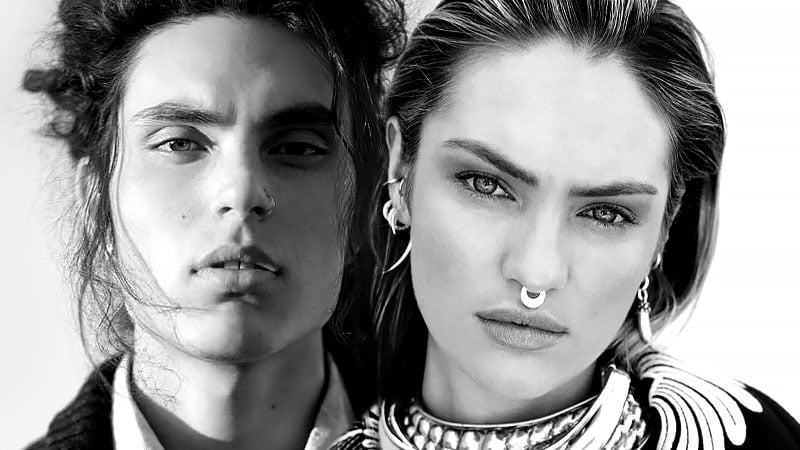
Give your aesthetic an edgy upgrade with a nose piercing. It’s a brilliant way to get creative and show your personality through facial jewelry. Plus, there are so many styles and options, from septum and nostril piercings to more complex ones such as rhinos and third eyes. Of course, with any body modification, you shouldn’t make the decision casually. There’s a lot to consider, including facial and nose anatomy, piercing type, jewelry, and risks. As such, we’ve compiled some of the must-know information to help make the decision easier.
RELATED: 15 Types of Ear Piercings You Need to Know
RELATED: All You Need to Know About Septum Piercing
What is a Nostril Piercing?
It is a piercing of the skin or cartilage of the nose, and it’s an excellent way to express yourself. The nostril piercing is the most common and can be worn by men and women, drawing attention to your face. There are several jewelry options to choose from and varying placements, letting you find what works best for you. This could be with studded jewelry and a pretty gem or a hoop. These piercings are relatively simple to get done and care for, and you are likely only to experience mild discomfort.

Nose Piercings Stages
Inflammation Stage
The first stage of piercing is the inflammation stage. The body is trying to heal, and there is some swelling around the jewelry. During this stage, the tissue around the piercing becomes red and irritated, which will last for around a week. If symptoms do not improve after two weeks, you will need to contact a professional as it may be infected. Be sure to keep your piercing clean and avoid picking at it. Do not change your jewelry.
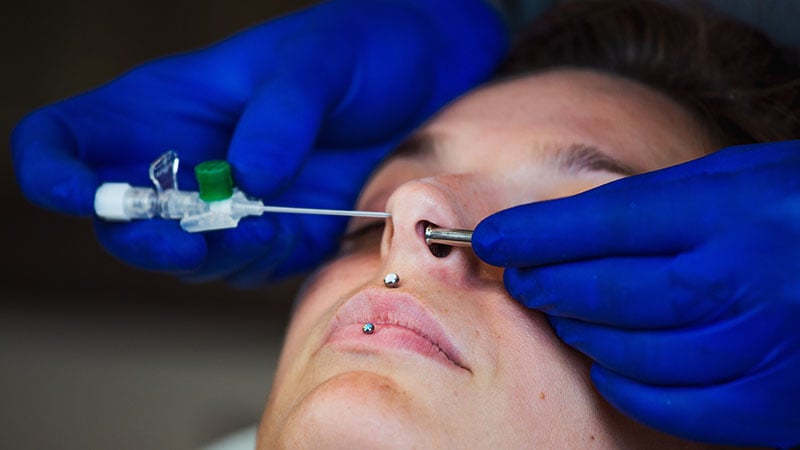
Healing Proliferate Stage
The next stage is the healing stage and some common things to experience during this period include bleeding, swelling, and bruising. You may also experience discomfort, and the site can be tender to the touch, although you should avoid touching it often as this can introduce bacteria and lead to an infection. You may also see a secretion of yellow fluid. It is not pus but a combination of blood plasma, lymph, and dead blood cells. Pierced nostrils will heal in around two months but can take longer. Be sure to practice proper aftercare to aid healing.
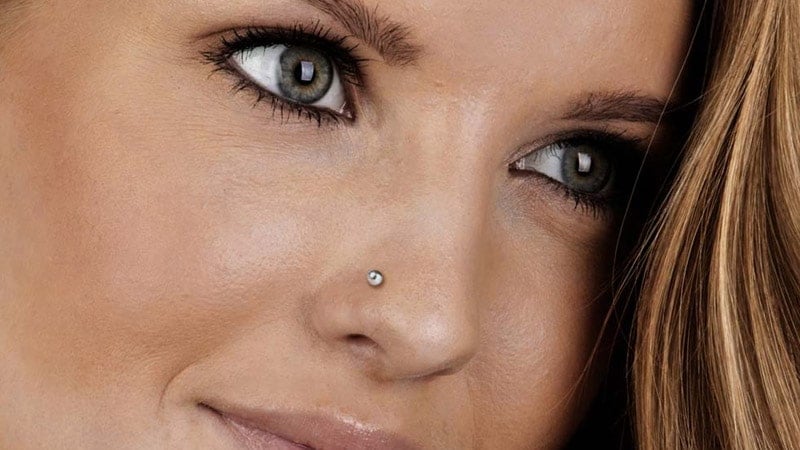
Seasoning/Maturation Stage
The last stage is when your piercing is fully healed. This can occur between two to four months after initially getting your piercing. This is when you can change your jewelry. It will be easy to remove and should not be painful.
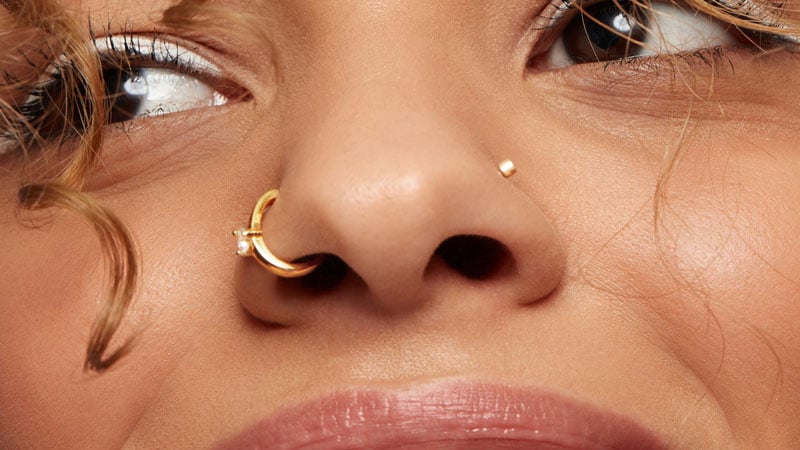
Nose Piercing Aftercare
The aftercare for a nose piercing is relatively simple. You want to ensure that it is kept clean, and you can do this by cleaning it twice daily with a saline solution. You also want to avoid touching the area as this can introduce bacteria and cause irritation. If you have to touch the piercing, ensure your hands are clean and washed first. A nostril piercing can take between two to four months to heal fully; you should not change your jewelry during this time. Watch out for any persisting tenderness, discomfort, and skin discoloration.
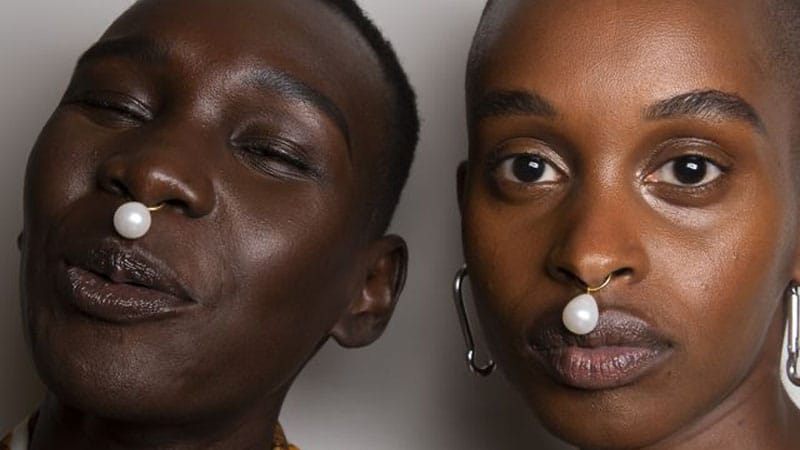
Nose Piercing Side Effects
As with any body modifications, there are side effects that may occur. The most significant risk is an infection if the piercing is not cleaned adequately, or there is a reaction to the material in the jewelry. Choosing a stud or ring made from implant-grade surgical steel or titanium will be the best option for avoiding allergic reactions. Other side effects could include the fact that your body might reject the piercing, it can close or grow over, and you’ll have to change how you blow your nose. Changing your jewelry can be tricky, depending on the style you choose, and you might also have to put up with other people’s judgment. However, many potential side effects can be mitigated by maintaining good hygiene and following the aftercare instructions.
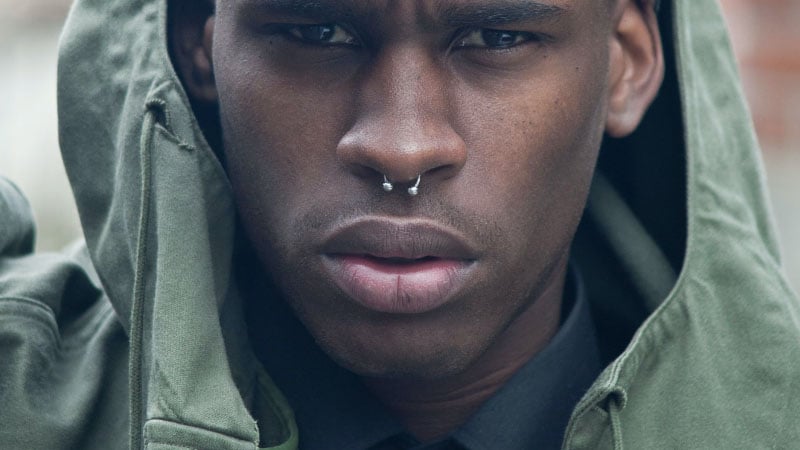
Nose Piercing Jewelry
There is a wide variety of jewelry styles and materials you can choose from when you’re getting your nose pierced. Some of the most common include studs, screws, barbells, and hoops. Part of the decision will be made by the piercing you’re getting, as well as by the standard jewelry the piercer uses. It’s best to choose something non-allergenic such as titanium or surgical grade steel when it comes to materials. Once it’s healed, you can look at other metals such as high-quality gold, but avoid anything that contains nickel and plated costume jewelry, which often uses mixed metals and dyes.
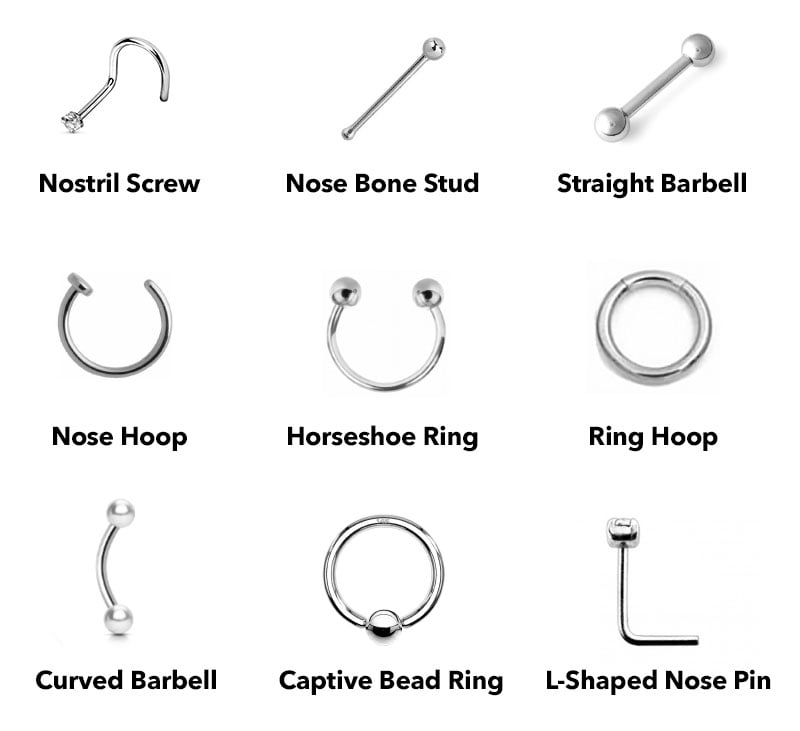
Studs
Nose studs are a popular choice for men and women. They are one of the most low-maintenance pieces of jewelry, and you do not need to worry about them getting snagged on clothing or your pillowcase. Nose studs are often used for a first-time piercing or during the healing period. There are several sizes to choose from and various styles with different gems on the top; this can be anything from diamonds to colored jewels, depending on your preference. This allows you to show off your individuality in a subtle way. In addition, studs are not as noticeable, making them easier to wear and lending themselves to various occasions.
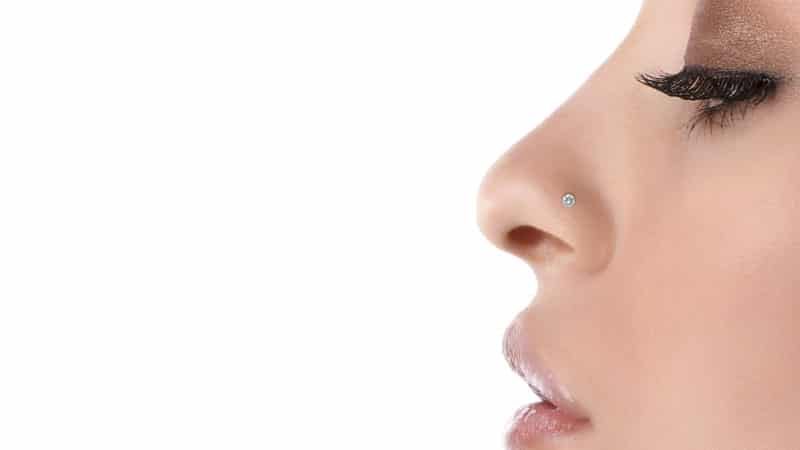
Hoops
Hoops or nose rings are other popular choices of jewelry. Using a stud while your nose heals is best to avoid healing with a slight curve, which a hoop would create. Most people switch to a hoop once their piercing has completely healed, and the appeal of this jewelry is that it is much more noticeable. You can experiment with different sizes and thicknesses; the bigger, the bolder. There are also several materials to choose from, depending on your preference.
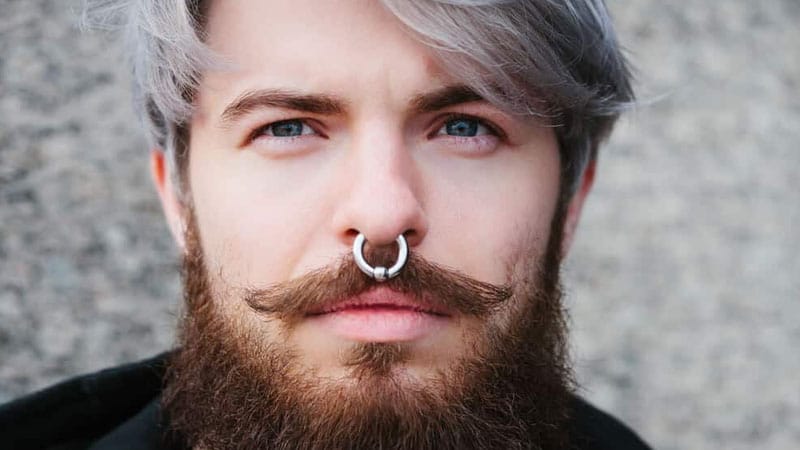
Nostril screws and Fishtails
Nostril screws and fishtails are another jewelry option for your nose piercing, but before wearing these, it is best to wait for your piercing to heal fully. This is because they can put pressure on the nose and make it more painful. Nose screws can be changed, and there are several options to reflect your personal style best but take care to choose the correct size and thickness. The fishtail is appealing because it offers a custom fit. It is measured to fit your nostril measurements, providing you with a more comfortable fit. They can also be bent to your desired angle and shape.
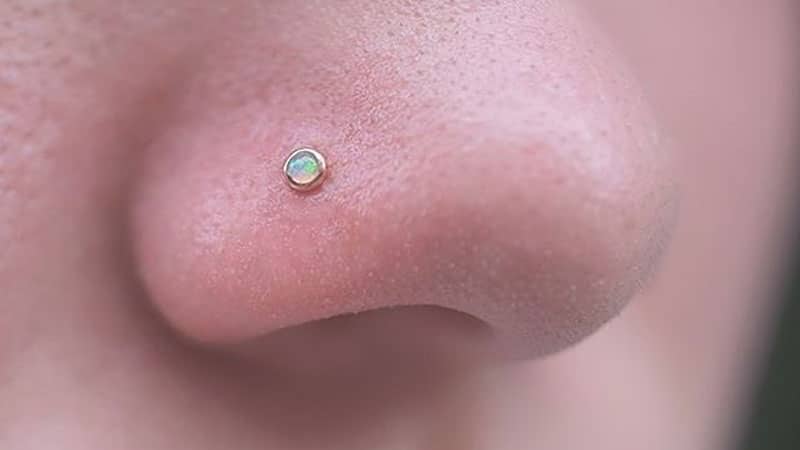
Nose Piercing Materials
There are many different nose piercings to choose from, allowing you to find the style that best suits you. There are also metals and materials to use, depending on your preference and budget. Stainless steel is one of the most common options because it is affordable and hypoallergenic, while 14K gold can be pricey but looks good and can be reserved for special occasions.
Titanium
Titanium is often used for initial piercings because it is nickel-free. This is a fantastic choice for someone who has a nickel allergy or has sensitive skin. It is also strong, light, and safe for the body but is more expensive than some other materials. That said, you will find the pros far outweigh the cost, and opting for implant-grade titanium can make the healing of your nose ring a simple and clean process.
14K Gold
If you want to add some bling to your nose, you can do so with a 14K gold stud or hoop. 14K is the preferred choice for piercings as lower than this, there is too much filler with other metals, and higher is too soft and not as durable. The great thing about 14K gold, as opposed to 24K, is that it will not be damaged as easily over time and with regular cleaning.
Stainless Steel
One of the most cost-effective options for piercings is stainless steel. It is readily available and cheap, allowing you to change your piercing regularly (once it has healed, of course). Surgical stainless steel is body-friendly and hypoallergenic. You want to be sure that the jewelry you choose is of good quality to avoid irritation and potential infection.
Silver
Silver is not recommended for first-time piercings, but it can be worn once the nose piercing is fully healed. There are several silver options to choose from, including pure silver or sterling silver. That said, most piercers will tell their clients only to wear silver jewelry for a short amount of time. Silver is a soft metal and can tarnish easily; this can also rub off onto the skin. The imperfections in the silver can also cause bacteria and result in an infection.
Types of Nose Piercing
While septum and nostril piercings might be the first thing to come to mind, there are many other options. Working from the top down, these include third eye, bridge, high nostril, nasallang, Austin bar, rhino, and septril. What you choose will depend on your personal style and preference. Some of them are more complicated than others, so make sure you do your research when picking an artist. You want someone with experience but who also operates out of a clean and hygienic space.
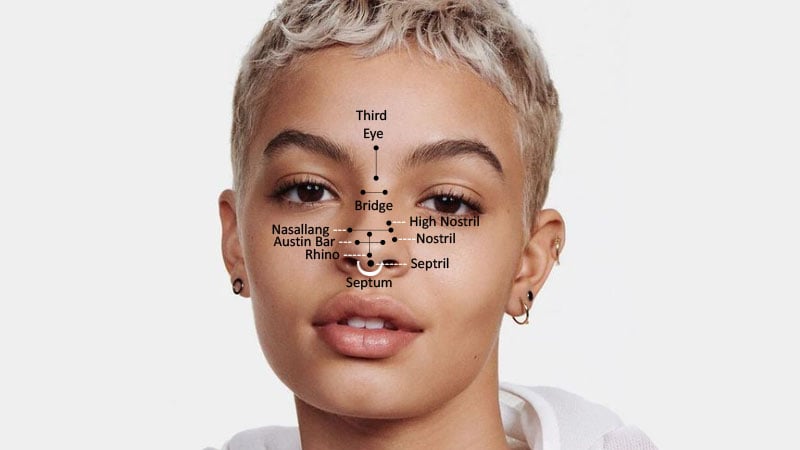
Septril Piercing
Septril piercings are one of the most complex and tricky nose piercings. They’re not as common but look amazing when done correctly on the right kind of nose. The process involves using the fistula, or healed flesh tunnel, of an already stretched septum piercing. A needle is then pushed from the bottom of the center of the septum, through to the former piercing, and the jewelry, often a curved barbell, is inserted. It’s a piercing that takes time, patience, and skill but can look both subtle and beautiful, as well as very badass.

Third Eye Piercing
If you’re looking for a truly unique look, why not consider the super trendy third eye piercing. It’s a dermal piercing that extends vertically from the bridge of the nose to the forehead. It’s also a trickier piercing, as there’s not much skin to grab. Two holes are pictured first, before the needle is inserted, followed by the jewelry. There’s a lot more poking about, so this one is not for the faint of heart. It can also be more prone to complications, including infection, migration, a higher risk of rejection, and getting caught on clothing. However, if all goes well, it can look exceptionally elegant, stylish, and distinctive.

High Nostril Piercing
A high nostril piercing is essentially the same as a regular nostril one, just placed higher up on the nasal bridge. The recommended jewelry for this look is a stud, screw, or L-shaped pin, as a regular ring won’t work. Your piercer will determine the best placement based on the shape and curvature of your nose. This style looks great with both a double and single stud.

Nostril Piercing
A nostril piercing is one of the most common nose piercings and is relatively easy to do. You’ll also get the most extensive range of jewelry choices with this option. There are roots for nostril piercings in Ayurvedic medicine, as it’s believed that a piercing through the left nostril can help ease the pain of menstruation and birth in women.

Nasallang Piercing
Another more intense option is nasallang. This tri-nasal piercing uses a single, long barbell to penetrate both nostrils and the septum. Your nose is clamped, and the needle is pushed through all three layers simultaneously, followed by the jewelry. As such, this is another one that’s not for the faint of heart. The result looks similar to having two single studs in each nostril. Unlike regular septum piercings, which usually misses the harder cartilage in the center of your nose, this does go through the thicker layer, as it sits higher up on the nasal bridge.
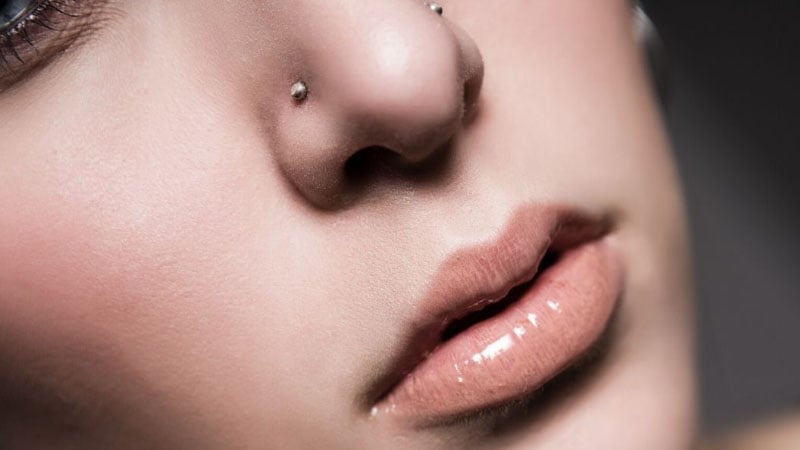
Rhino Piercing
Stand out from the crowd with a rhino piercing. Like a Third Eye, this is another verticle piercing. It goes from the center bottom of your septum through to above the tip of the nose. The name comes from the similarity it has to a rhino horn, especially when tipped with a spiked end. The process is relatively simple, piercing using a standard piercing needle and curved barbell. However, the cartilage at the tip of the nose is much more complex, so positioning and technique need to be perfect to avoid damage and unnecessary trauma. This piercing has a long history in some African and South American tribal cultures but only recently has started appearing more in the West.
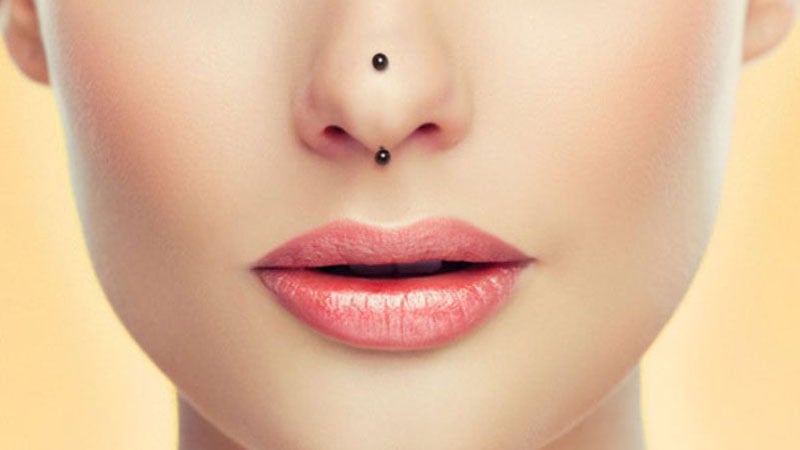
Austin Bar Piercing
Austin Bars are similar to a nasallang yet are relatively uncommon. It’s a piercing that goes straight through the tip of your nose; however, unlike a nasallang, it doesn’t penetrate either nostril or the septum. Often the jewelry used is a barbell. The name comes from the first person who had this piercing, which Patrick Bartholomew, a piercer from London, performed. Visually, it can look very much like a mantis piercing.
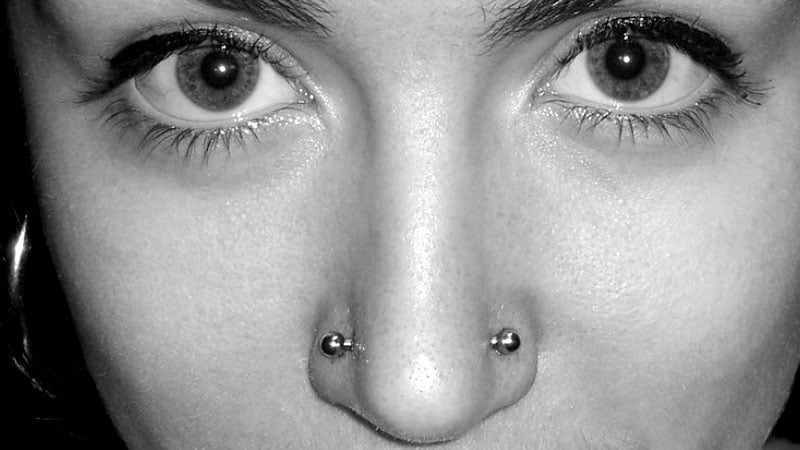
Bridge Piercing
Draw attention to your eyes with a bridge piercing. Also known as an Erl, this is a bold surface piercing that sits on the bridge of your nose between your eyes. Because it is a dermal piercing, it can have a higher risk of infection, migration, and rejection. As such, you need to keep a close eye on it while it’s healing. While it looks fantastic, there are a few things to keep in mind, including whether or not you wear glasses. If you do, you’ll want to make sure the placement is such that you can still wear them. You’ll also need to be careful not to snag the piercing on your glasses or clothing. Luckily, the jewelry used is commonly a shorter, curved barbell, which hugs the shape of your face.

Septum Piercing
The septum is another reasonably common nose piercing that looks great on both guys and girls. There’s a small, thin membrane of skin that sits in the center of your nose, between the end of the septum and the tip of your nose. That thin membrane is where the piercing goes through. One of the benefits of a septum piercing is that it’s easily hidden with the right kind of jewelry. As such, it can be a good option if you need to adhere to dress codes for work or hide it from your grandma. Because it is more common, you also have a wider range of jewelry options. Choose from jeweled mandalas, subtle rings, studded horseshoes, and thick gold rings.
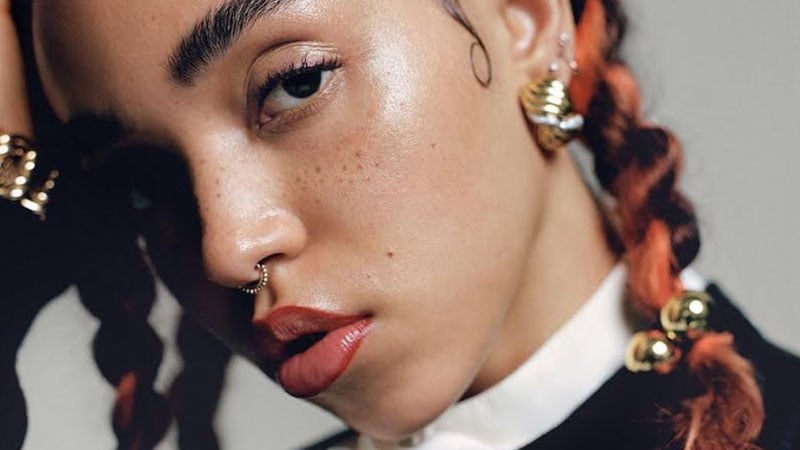
FAQs
What does a piercing in the nose mean?
In some cultures, such as Africa, the Middle East, and Asia, where nose piercing has a long history, it can have significant meaning. It can symbolize marriage, wealth, or fertility. Conversely, in the West, it's often seen as a sign of rebellion against conventional expectations and beauty standards.
How bad do nose earrings hurt?
A nose piercing is on the low end of the pain scale. It will feel more like a pinch and may make your eyes water but is generally around a three or four out of ten in pain. Keep in mind, pain tolerances between people can vary, so keep yours in mind before jumping in!
What should I know before getting my nose pierced?
There are a few things you should research before you get your nose pierced. Perhaps most importantly is finding an experienced piercer. You'll want one that uses proper hygiene practices, including a clean venue and properly sterilized tools. Beyond that, you should know what kind of piercing you want, as well as the risks associated with it. It is also essential to know what type of material you'd prefer your jewelry to be made of and if you have any allergies to metals. Finally, while your piercer will go through aftercare, it's good to know what to expect and to have everything on hand.
How much is a nose piercing?
Expect to pay between $30-$100, depending on the kind of piercing and the jewelry you're using.
How to clean nose piercing?
The best way to clean a nose piercing is to soak it regularly with saline. Don't touch it with dirty hands, be careful sleeping and changing clothes, and avoid using alcohol or chemicals. A yellow crust forming around the piercing is normal and expected. Avoid picking at it and soak it with a saline solution to gently remove the debris. If you experience inflammation, use an ice compress and ibuprofen. However, if it gets worse or doesn't subside within a few days, head to your general care practitioner for medical advice.
What is the correct side to pierce your nose?
There is no right or wrong side to wear your nostril piercing; however, the left is preferred. That said, this decision should be made on personal preference. Perhaps you want to highlight one particular side of your face, or it complements your bangs or side parting.
What is the significance of nose rings?
The significance of nose rings differs depending on the country and the culture. It can symbolize wealth, fertility, marriage, and spiritual enlightenment, and there is a long history of nose piercings. However, it is often associated with personal style and rebellion in the West. A nose ring can be a way to express yourself and modify your appearance in your chosen way.
What do I do if my jewelry falls out of my nose piercing
If your piercing has not fully healed and it falls out of your nose, you can try to put it back in. It would be best to take precautions to ensure both the jewelry and your hands are clean. However, piercings can close within minutes when they are new, and the process can be incredibly painful. This could also open you up to the risk of infection and irritation. It is thus better to go back to the shop where you were pierced. If your piercing is fully healed, you can reinsert the jewelry.
How old do you have to be to get a nose piercing?
The age can differ from country to country, but in general, you will need to be over 16 years old and show a valid form of ID when getting your nose pierced. In some countries, you may also require parental consent if you are under 18, either in written form or with a parent or guardian present.
Can you get your nose pierced with a gun?
It is not recommended to get your nose pierced with a gun. It should be done by a trained professional who will use a hollow needle. The gun should only be used for earlobes, as using it on the nose can cause trauma and damage to the surrounding tissues.
When can I replace my nose piercing?
It would be best not to change your nose piercing from the initial pierced stud or hoop until it has fully healed. This process can take around two to four months. A good indication that your nose piercing has healed is that it no longer hurts, has no sign of redness, discharge, or discomfort. If your nose ring looks healed before two months, you should still wait. If you are still experiencing tenderness, wait even longer.
How to change out a nose piercing?
Before changing your nostril piercing, you want to ensure that it has fully healed. Once you have established this, wash your hands well and ensure that the new jewelry you wish to use is clean. Remove the stud or hoop and rewash your hands. Place the new jewelry into your piercing. If you have a crust build-up at the end of your nose bar, you can use warm water to loosen it.
Alexandra Linde is an experienced writer holding a bachelor's degree in Journalism. She is the owner of Alexandra McKiterick Creative and has expertise in travel, fashion, fitness and lifestyle. Alex has previously written for Flightcenter, Travello, and Backpacker Deals.
SUBSCRIBE TO OUR NEWSLETTER
Subscribe to our mailing list and get interesting stuff and updates to your email inbox.
